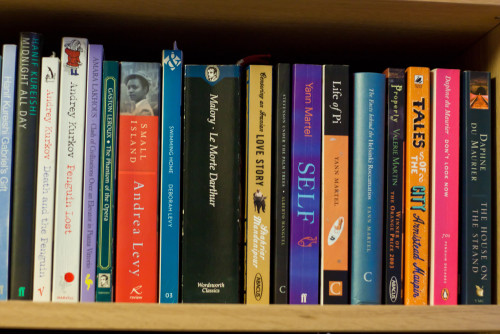Genre limitations

As anyone who reads this blog/scans my reviews archive can tell, my reading leans heavily towards literary fiction. Sure, there’s a pinch of sci-fi and a touch of comics (an increasingly large touch) and a sprinkling of literary essays, but overall my reading has a clear leaning. I don’t necessarily want to change that – I enjoy most of what I read – but I would like to widen the boundaries a bit more.
A recent trip to my Dad’s house had me scouring the familiar old bookshelves and remembering how I used to read a lot of autobiographies (my Mum’s influence, I suspect) but also had phases of horror/thrillers, comic fantasy and historical romance, none of which I read a whole lot of these days. It could just be that my tastes have changed (I’m certainly more squeamish about graphic violence) but it could be that I have discounted whole sections of the bookshop through a combination of poor memory/one bad experience tainting the genre/snobbery.
And this is where the idea of genre divisions falls down. I get that some people have a strong preference for a certain genre and so find the separation helpful, but for the most part genres are a marketing tool and actually limit what people read because they create boundaries and divisiveness. Add to that all the fights about classification (why are sci-fi and fantasy so often banded together? ditto crime and horror? do certain classifications put an author at an advantage or disadvantage?) and I begin to dream of a Utopian world without fictional genres.
But then again my own home library is divided into…wait for it…genres. Not all of them, but there’s sci-fi, fantasy, graphic novels, children’s, literary non-fiction, poetry, general fiction and reference. Partly that’s practicality. Our fantasy books tend to all be the same size so it was easiest to put them all on the same shelf. Graphic novels and comics tend to be tall so it made sense to give them their own tall shelf (or three). Ditto reference books. And for the rest, it was a case of making it easier to remember where things are.
The biggest collections (and hence the biggest division) are literary fiction and sci-fi, because that’s roughly the divide between my reading and Tim’s. Some of his books are in general fiction and some of mine are in sci-fi, but not many. It’s not that we didn’t want to mix up our books, but I like to keep tabs on what I have and haven’t read of the books I have bought/been given. However, I have not read most of Tim’s books (I’m slowly working on that). So how would I manage the TBR? I’m sure we’d find a way, and with my love for rearranging my library I may well organise them completely differently in the future.
What are your thoughts on genres? Do you find them useful or not?
The idea of genres as I understand it is that it gives us as readers a sense of what to expect since each genre has its own characteristics. So yiu get the familiarity factor. But yes I do think some of the sub divisions and newer genres are governed by marketing specialists seeing a niche. – like young adult.
It’s probably always been that way, but the more books get split into increasingly specific genres, the less I think it’s helpful to readers and it becomes more unnecessary/confusing.
I think as humans, we like to compartmentalize things (at least I do) and it’s no different with books. Personally, I like using genres, especially since I identify myself as primarily a reader within the crime fiction genre. However, that said, I have found books at our library that aren’t classified as “mystery,” that still are. I think crime fiction for myself is a little bit of a broader term.
Which is fine if you’re willing to search for those other books out there. But if you hadn’t, you would have missed out because of someone else’s decisions on how to divide up books.
I’ve never thought about it that way. Separation of genres does limit people’s scope of reading, but on the other hand, many people want their scope narrow.
Crime. Is THAT where horror is??? I’ve been looking for it for R.I.P. X and couldn’t find it.
I have my books separated by fiction and nonfiction. Then I separate my nonfiction a little bit by subject.
Heh, yes, there is a degree to which it’s all subjective and different bookshops or libraries categorise differently. Maybe that’s a ruse to make sure no-one only looks in the one area every time!